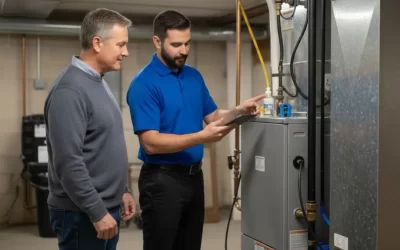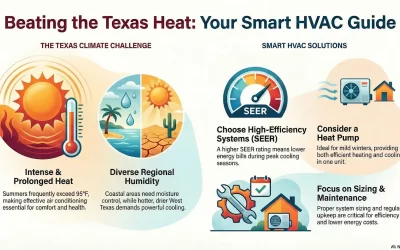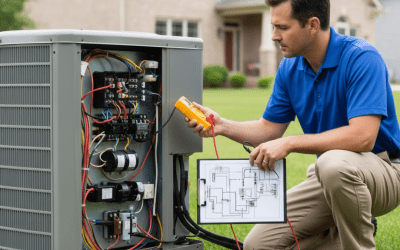As the temperature rises, your HVAC system becomes an essential companion in maintaining a comfortable and refreshing indoor environment. However, while constantly working, the system might start malfunctioning and developing problems such as inadequate cooling, higher humidity levels, and poor air quality. To ensure that your HVAC system operates at its peak performance, it’s crucial to implement some effective maintenance and careful usage tips for the scorching months ahead. Let’s explore HVAC tips for summer to keep your space cool and inviting even when the sun is at its most unforgiving.
Understanding Your HVAC System
HVAC means Heating, Ventilation, and Air Conditioning. A system or technology used to control the indoor environment of buildings such as homes, offices, schools, hospitals, and other facilities.
Heating: HVAC systems provide heating during colder months by generating warmth through methods like furnaces, boilers, or heat pumps. These systems distribute heat throughout the building to maintain comfortable temperatures indoors.
Ventilation: It is the process of exchanging indoor air with outdoor air to maintain humidity and indoor air quality. HVAC systems include ventilation components such as fans, ducts, and air vents to circulate air, remove indoor pollutants, and regulate humidity levels.
Air Conditioning: HVAC systems also provide cooling during warmer months. This is typically achieved through air conditioners or heat pumps, which use refrigerants to absorb heat from indoor air and expel it outdoors, resulting in cooler indoor temperatures.
Basic Components Of An HVAC System
- Heating Unit
- Cooling Unit
- Ventilation System
- Thermostat
- Ductwork
- Air Filters
- Refrigerant
Hvac Tips For A Cool Summer
Assess Your Thermostat
The thermostat acts as the brain of your HVAC system, helping it cool down the room temperature effectively. When you set the thermostat to a cooler temperature than the current room temperature, it signals the air conditioner to start cooling the air. Once the room reaches the desired temperature, the thermostat signals the air conditioner to stop. Basically, the thermostat tells your HVAC system when to work and take a break, ensuring that your home stays comfortable without wasting energy by unnecessarily running the air conditioner. So, by adjusting the thermostat to your preferred temperature, you can control how cool your home feels and keep your energy bills in check.
Clean Air filters
Clogged filters restrict airflow, forcing your HVAC system to work harder and consume more energy. Regularly cleaning air filters can help improve airflow efficiency by capturing airborne particles such as dust and pollen. If you have a pet that sheds a lot of hair and produces abundant pollen, consider changing the air filters every 45 days to ensure optimal performance of your HVAC system.
Refill Refrigerant
Your home’s cooling system requires refrigerant to operate effectively. The refrigerant will eventually exhaust with time. Make sure to inspect it frequently and refill it before it runs out of supply.
Condenser Coils
The condenser coils hold the liquid refrigerant in your air conditioner. When these coils get dirty, they block the airflow, reducing your system’s cooling efficiency. Thus, you should inspect and clean the condenser coils periodically to maintain the optimal performance of your air conditioner and to reduce overheating.
Air Ducts
Properly insulated and sealed air ducts are essential to maintain the desired temperature of a room. Improper installation can result in energy loss and uneven distribution of cool air. So, always ensure that air leaks in the ducts are sealed correctly to maximize cooling efficiency.
Schedule Maintenance Appointments
Schedule professional appointments atleast once a year to increase the cooling of your HVAC system. The technicians can inspect, clean, and tune up your HVAC system, identifying and resolving potential issues before they escalate.
Consider Upgrades
Older HVAC systems consume more energy, need frequent repairs, and generate more heat. So, replacing your outdated HVAC system is crucial if it’s creating new problems every other day. Investing in upgrades such as programmable thermostats, zoning systems, or ductless mini-split systems can provide long-term savings and enhance cooling efficiency.
Heat waves are no joke. Use these proven tips to stay cool reliably all summer long.
Other Summer Hacks for Maximum Coolness
Shield Your Indoor From Sunlight
If your windows are bringing a lot of sunlight to your indoors, maintaining optimal cooling would be hard for your system. You can reduce solar heat gain by installing curtains, blinds, or awnings on windows. This will help in reducing the workload on your HVAC system and cool your home much faster.
Use Ceiling Fans
You can install awning fans in your home as these enhance the airflow tribute cool air. The use of fans can create a sensation of cooling in the air, which can help you feel more comfortable. This effect is known as wind chill and allows you to increase the thermostat temperature without experiencing any discomfort. This helps your HVAC system work more effectively by reducing hot spots and maintaining a consistent temperature.
Conclusion
These HVAC tips for summer have guided you on how to keep your environment cool during the hot days. It is essential to take measures like coil condenser maintenance, air filter cleaning, and refrigerant refilling to ensure the efficiency of your HVAC system. Additionally, installing shades and ceiling fans can also help maintain a comfortable temperature in your space during burning days.
If you also want your environment to stay cool and comfortable all summer long, contact HVAC New Braunfels, TX, for the best services.






